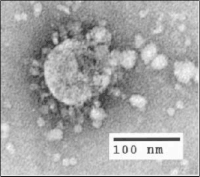
Photo from wikipedia
The microbiota of the nasopharyngeal tract (NT) play a role in host immunity against respiratory infectious diseases. However, scant information is available on interactions of SARS-CoV-2 with the nasopharyngeal microbiome.… Click to show full abstract
The microbiota of the nasopharyngeal tract (NT) play a role in host immunity against respiratory infectious diseases. However, scant information is available on interactions of SARS-CoV-2 with the nasopharyngeal microbiome. This study characterizes the effects of SARS-CoV-2 infection on human nasopharyngeal microbiomes and their relevant metabolic functions. Twenty-two (n = 22) nasopharyngeal swab samples (including COVID-19 patients = 8, recovered humans = 7, and healthy people = 7) were collected, and underwent to RNAseq-based metagenomic investigation. Our RNAseq data mapped to 2281 bacterial species (including 1477, 919 and 676 in healthy, COVID-19 and recovered metagenomes, respectively) indicating a distinct microbiome dysbiosis. The COVID-19 and recovered samples included 67% and 77% opportunistic bacterial species, respectively compared to healthy controls. Notably, 79% commensal bacterial species found in healthy controls were not detected in COVID-19 and recovered people. Similar dysbiosis was also found in viral and archaeal fraction of the nasopharyngeal microbiomes. We also detected several altered metabolic pathways and functional genes in the progression and pathophysiology of COVID-19. The nasopharyngeal microbiome dysbiosis and their genomic features determined by our RNAseq analyses shed light on early interactions of SARS-CoV-2 with the nasopharyngeal resident microbiota that might be helpful for developing microbiome-based diagnostics and therapeutics for this novel pandemic disease.
Journal Title: Scientific Reports
Year Published: 2021
Link to full text (if available)
Share on Social Media: Sign Up to like & get
recommendations!